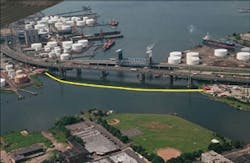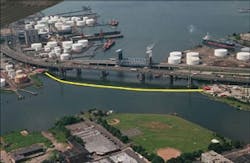An Interview with B&V Water's Dan McCarthy
- Black & Veatch Water’s CEO Dan McCarthy on the exciting challenges of today’s water business, being a global player and the role of the private sector.
Black & Veatch Water CEO Dan McCarthy
WWi had an opportunity to speak with McCarthy at the in April 2008 at the IDA/GWI Blue, Green & Gold: The Future of Water, Finance & the Environment conference in Zurich, Switzerland. A synopsis of the interview was included in the "Exective Watch" column of the magazine's June/July 2009 issue, "The Water Engineers with Black & Veatch’s Dan McCarthy." What follows is the full interview in Q&A format:
WWi: How did you come to work in the water sector?
McCarthy: My first project after graduating as a structural engineer was on a water treatment facility, after which I went back to university to study water. In my early days at Black & Veatch I had the tremendous opportunity to shadow the general manager of a utility on secondment, and see how he successfully navigated his way through public meetings, and worked with governmental and regulatory authorities. I learnt that even when the technologically best solution is on the table, it may not be the most acceptable one. It has to also be in balance to what you can afford to do, and how it impacts the community and the environment. A spell in the arid west of the US had me dealing with many of the water stress issues we are now dealing with today in many other parts of the world. And being part of the design team for an early design-build project in Milwaukee exposed me not only to what became known as EPC -- engineering, procurement and contracting, but also ozonation and the first use of membranes to prevent outbreaks like Cryptosporidium. I was given organisational responsibilities in the 90s, and took over the global water business in 2004. I am very proud of our achievements since then, especially in forming a truly functional global team from a loose network of largely independent locations. Our integrated global workforce means that staff can work on exciting projects abroad even before the issues faced there come into their home market: a kind of advanced peak as to what is coming, if you like. Through this we can draw on a great pool of expertise and experience from around the world in serving our customers.
WWi: How would you describe the state of the water sector at the moment?
McCarthy: The economic downfall has certainly not made the challenges we are facing in the industry any easier, but we are seeing a very varied impact in different parts of the world. Economies that are more dependent on high economic growth and have seen the housing market collapse are most affected. But in other more robust areas investments are ongoing or even being brought forward to take advantage of lower costs of commodities, energy and personnel. At Black & Veatch, we’ve pulled back to a 12-18 month view of the various business scenarios and, like our customers, are being more frugal at the moment, focussing investment on highest priority areas. Having said that, we’re not seeing a major impact in business growth or any significant project postponements, and are confident that both the sector and B&V will perform strongly in the coming months.
WWi: Do you think governmental stimulus projects will “save the day”?
McCarthy: Every bit helps, but direct investment in water infrastructure probably has less impact than the overall state of local economies. In the US, for example, utilities are facing revenue shortages due to late or non payment by consumers who are struggling to make ends meet. Industrial users are sizing down operations or closing shop altogether. Having said that, communities are now demanding more attention be given to their water and wastewater services, and a deeper understanding of what investments are required is evolving. Just like with cellphone services where you need a good network for quality calls as well as the handset, they increasingly appreciate the complexity of what’s behind the tap and toilet.
WWi: What are utilities doing to continue improving water services?
McCarthy: We are seeing a big drive to optimize operations and save costs, for example with sustainable energy solutions. Many clients are asking us to help out with energy audits, optimize energy tariffs, increase the use of renewable energy, recover more energy, and use their waste streams as an energy source. There’s a healthy drive to making operations more sustainable, advancing environmental stewardship and becoming more robust economically. There’s a lot of reflection and shaping of the future going on.
WWi: Black & Veatch is a major player in both the water and energy fields. Does that help?
McCarthy: Absolutely. We consider ourselves a nexus between water and energy and are helping clients find a better balance. On the one side, water is a major cost component in power generation. And on the other, energy is a major resource in the treatment and transport of water. Energy companies no longer assume their water supply is infinite, and carefully plan their use and how to share water with their neighbors. They strive for water efficiency and high levels of re-use. And water utilities are consciously increasing the proportion of renewable energy they consume, by drawing on more solar or wind sources, or even building their own plants, as well as generating more energy endogenously with hydropower and the use of biomass and biogas.
WWi: what about Black & Veatch’s own “greenness”?
McCarthy: We have a widespread sustainability initiative that goes to the core of the company’s values. Our facilities and offices are becoming more and more efficient, and we have introduced a reporting system for measuring each location’s carbon footprint and demonstrating its reduction. Our corporate social responsibility program is having a high impact through our “Building a World of Difference” foundation. In this we align our philanthropic goals with the areas of expertise we can best help with as engineers and technologists. So the quest for safe water supplies and sanitation are a focus, for example, as is education in order to generate more interest and opportunities in the waning engineering disciplines.
WWi: We’re here in Zurich at the GWI/IDA Water Meets Money conference, discussing ways the private sector and financial community can participate in the water industry. How do you see that role?
McCarthy: I think the private sector often has more possibilities to take decisions that make sound long-term economic sense and be a driving force for innovation. It can take the burden of the day-to-day running of a business off governmental shoulders, and act independent of political cycles that may affect investment decisions. There are concerns associated with private sector participation in many areas of the world, unsurprisingly given the vital nature of water, but it is a business model that has proven to work under the right conditions. In developing countries, it is a good way to jump-start water services and attract investment. In developed countries, I understand the hesitance to change when things are seemingly running well, but numerous cases have proven the value of public-private-partnerships.
WWi: Much interest has been shown by investors here in ground-breaking technologies. Would you say that – above all industries – the water sector has the innovation drive to put man on mars?
McCarthy: Possibly not! But that is simply because the risk of failure is much greater with water. Public health is not something to be tampered with. So reliability is a more important driver. Having said that, I have seen the sector change from highly conservative and fragmented to harnessing innovations that help rise to the challenges we face in a more coordinated manner worldwide. Changing perceptions and demands are driving efficiency into operations. More stringent water quality standards, and the effects of climate change are overwhelming existing infrastructures. And developing countries are demanding a completely different approach: decentralised systems with point-of-use treatment rather than large centralised plants. That brings along a whole new set of challenges that require new technological applications. Building bigger and better central facilities is futile when you lose 60 or 70% of that finely treated water in the network. On the wastewater side it makes sense to harness technology to collect, treat and reuse locally rather than building up and maintaining a massive network of sewers.
WWi: Desalination is obviously another focus of this conference. What trends do you observe?
McCarthy: Another discussion here was around the savings in energy cost a potential nuclear power revival might have on desalination. While any drop in cost makes desal more feasible, I believe that technological developments are the real driver in this market. More and more applications have helped lower the cost of technology and increase investor attractiveness. We’ll see better reverse osmosis systems and energy recovery devices as a result. But I am most excited to hear about a range of completely new technological ideas and developments that will drive the more widespread economical use of desalination.
WWi: Finally, what comes to mind with the following words and expressions? Biofuels…?
McCarthy: Depending on the type of biofuel, there are some troublesome issues associated. For example, the amount of water and energy needed to grow and refine the crops is a challenge, as is the impact on food prices. If biofuels, then sustainable ones.
WWi: Water Framework Directive…?
McCarthy: From an egoistical perspective, you might say I am not opposed to stricter regulations as they drive business. But, seriously, we need to have forward thinking policies to set strategic direction, otherwise every utility has to figure it out for themselves.
WWi: Water: global or local…?
McCarthy: Local, without a doubt. What’s lost to many is that the cost of delivering water is not the same every place you go: it depends on the sources available and the quality of those sources. So when moving home from a water-rich area to a water-scarce area, you can’t expect to pay the same price for the service, like you might for the phone or cable TV.
-30-
CONTACT:
Black & Veatch Water
11401 Lamar Ave.
Overland Park, KS 66211
Overland Park, KS 66211
Tel: +1-913-458-2000
Fax: +1-913-458-2934
Email: waterinfo@bv.com
Web: www.bv.com

